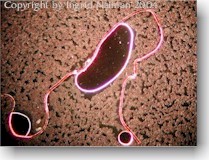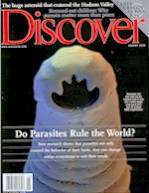

Parasites
Hulda Clark's book The Cure for All Cancers sold millions of copies. She was convinced that parasites are a critical factor in the development as well as treatment of cancer. Despite her role in drawing worldwide attention to this enormous health challenge, specialists in tropical medicine as well as several Russian doctors—not to mention veterinarians—were well aware of problem before Clark's publications became best sellers.
Decades ago, I read something in Tibetan medicine about miniature copper colored forms of life that normal eyes cannot see that are pathologically linked to cancer. Writing almost at the same time in Europe rather than the Himalayas, Hildegard of Bingen, in describing her violet salve, said that the "vermes" will lick the salve and die. The word "vermes" has been translated "viruses," but a viral link to cancer remains a subject of debate, and one professional translator I know feels that "vermes" could also be translated "lice," not perhaps what we think of when we say parasite, but nevertheless something small and aggravating. The Tibetans and Hildegard possessed a remarkable clairvoyance and were able to witness internal operations of the body that scientists have yet to discover.
Some time back, I was loaned a darkfield microscope by someone who drew the blood and allowed me to watch what was happening to the blood for weeks on end. I became so fascinated that I read over 3000 pages on parasitology in medical textbooks. The gist of what I learned is that parasite infections are rampant, affecting about 3.5 billion people on the planet. There are countless different types of parasites and the dangers and symptoms are different from one parasite to another.
Some of these live for 30 years, and as I explained to one person, "a parasite is something that has first dibs on your dinner." The pictures in the parasitology books are as shocking as watching the Godfather, but one cannot close ones eyes in the hopes that the truth will somehow disappear.
The picture on the left was taken in Germany. The patient had breast cancer and the parasite is, as you see, enormously long. This is a photograph was taken at low magnification. The three puddles are immersion oil (and to be ignored). The rest is a single long, red parasite that was suctioning erythrocytes, almost like a vacuum cleaner. What the textbooks do not discuss is any direct linkage between cancer and parasite infection. This idea is unique to certain schools of thought, but I found some support for the theory on the official CDC website.
What I might propose is avoiding overgeneralizations and attempting instead to look at what a parasitic infection might do. To make the context of this suggestion clear, I might say that while mercury poisoning may undermine health and make it harder to defend against certain pathogenic organisms, it may or may not "cause" cancer. Likewise, parasites live in very curious relationships to their hosts that may or may not exacerbate the risk of cancer.
Hulda Clark put most of her emphasis on one particular type of parasite, a fluke. It is nasty, but merely one of 3000 possibilities. Some parasites can enter the body through extremely casual contact, as minor as handling a pencil touched by an infected person. Sometimes the infection occurs through ingestion and the right set of circumstances to enable survival. Insect bites are another means of transmission, and one program on Discover Health estimated that two-thirds of all people who have ever lived on the Planet have died of malaria. We all know that malaria is once more an epidemic, probably in reverse relationship to pesticides such as DDT. With global warming, the temperate zones now also have more parasites and more diseases related to parasite infection. In short, writing off the possibility of infection is probably unwise.
Parasites adapt almost miraculously to their hosts and are therefore apt to thrive on the nutrition that is best for the host. I have spent considerable time with herbalists, veterinarians, and doctors discussing the various behaviors of parasites. I think it's worth discussing what would make for a realistic protocol.
First, one needs to eliminate the parasites. Pharmaceutical medicine uses such dangerous drugs for this that textbooks often have statements to the effect that unless the parasite infection is life-threatening, the cure may be worse than the disease. This is not true of herbal treatments, but some of the treatments are more aggressive than others.
My personal preference is to take something anti-parasitic starting ten to three days before the full moon. The protocol should be continued for two to three weeks. Then, I feel it makes sense to give the body a chance to recover a bit. I have never really been in a situation in which I could observe intestinal parasites, but with all the herbal formulas I used experimentally in Germany, most of the blood parasites died in the first 24 hours after ingesting the herbs. With this method of destruction, the parasites die and are eaten by bacteria, giving rise to the feeling that one has an infection. In most cases, the patient felt a little weak but not enough to remain in bed. It takes the bacteria about five days to eat the fleshy parts of the parasites; when they are finished, the white blood cells eat the bacteria and the overall condition of the blood starts to improve. Because the parasites lay eggs, tens of thousands of eggs per day, and because reinfection is always a possibility, it is likely that the cycle of treatment has to be repeated, possibly quite often.
After treatment, there is still the need to heal. Parasites sometimes perforate organs. They also tear up membrane linings in the intestines, they suck blood, they deposit excrement in the body that puts off an ammonia gas, and so on and so forth. I believe it is important to use rejuvenative tonics once completing the parasite protocol. I usually suggest that people think of devoting a year and a half to liver regeneration. Some people also need heart herbs or kidney herbs or colon herbs or even brain herbs. It is extremely difficult to find proper supervision for this kind of program. Medical doctors tend on the whole to ignore the possibility that parasites are the cause of the complaints for which people consult them. Laboratories seldom run proper tests on the specimens submitted to them for examination. Patients end up taking matters into their own hands and are therefore also put in situations in which they have to interpret for themselves what their own needs are. I know, I lived in Asia for many years and was medically evacuated once and seriously ill on prior occasions as well.
My own sense is, if in doubt, start one of the regimes to see if it seems to shift anything in a positive direction. If it does, work on the premise that what you are doing is helpful . . . and keep going. If you can find someone to supervise this work, great, but I think you are going to be frustrated if you look for help in the normal places. Try a doctor from a Third World country to see if he or she is more sympathetic to your questions and need for answers.
The parasite protocols offered on this site can be broadly defined as:
A variation of the Hulda Clark recommendations. We have a number of brands of black walnut extract, both alcohol-free and in conventional tinctures, made, of course, from the green hulls. Cloves are available as a powder that can be capped, added to food, or gulped with honey. We also have an excellent essential oil of clove buds. Wormwood is available in herb form or as an ingredient in broader formulas.
An Ayurvedic protocol using Para Cleanse from Banyan Botanicals in conjunction with their Blood Cleanse and, if desired, Liver Formula and Kidney Formula.
Various Rain Forest formulas that can be presumed to be more effective against South American parasites.
My own ParaPro set that includes three formulas to be used sequentially: Arjuna's Arrows for 1-2 days, followed by Dragon Dreams for 5-6 days, and then Phoenix Rising for a week. The cycle can be repeated as often as necessary.
Several forms of Artemisia annua, a famous anti-malarial herb that has been found effective in cancer treatment.
Ingrid Naiman
Copyright by Ingrid Naiman 2001, 2006
New research shows that parasites not only control the behavior of their hosts, they can change entire ecosystems to suit their needs.
August 2000 Cover
http://www.discover.com"Hookworms sink their teeth into the intestinal walls of more than a billion people every day to drink their fill of blood."
More on parasites on Kitchen Doctor!
Photomicrographs and Parasite Protocols
Flash Presentation on Parasites

Sacred Medicine Sanctuary
Copyright by Ingrid Naiman 2001, 2006, and 2014
The information on this site is presented as a public service. The site owner, author(s), Seventh Ray Press, Sacred Medicine Sanctuary, server, and web manager(s) are not responsible for how the information is applied nor for any outcomes.
The information provided on this site is for educational and informational purposes only. The statements and products have not been evaluated by the Food and Drug Administration and are not intended to diagnose, treat, cure, or prevent any disease.
The material on this site should not be used to replace professional medical care. You should always consult a health professional about specific health concerns and problems.



